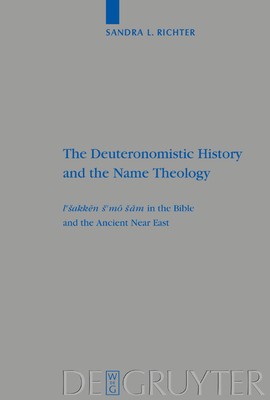
- We will send in 10–14 business days.
- Author: Sandra L Richter
- Publisher: De Gruyter
- Year: 2001
- Pages: 258
- ISBN-10: 311017376X
- ISBN-13: 9783110173765
- Format: 16.3 x 23.5 x 1.9 cm, kieti viršeliai
- Language: English
- SAVE -10% with code: EXTRA
The Deuteronomistic History and the Name Theology (e-book) (used book) | bookbook.eu
Reviews
Description
This monograph is a comparative, socio-linguistic reassessment of the Deuteronomic idiom, leshakken shemo sham, and its synonymous biblical reflexes in the Deuteronomistic History, lashum shemo sham, and lihyot shemo sham. These particular formulae have long been understood as evidence of the Name Theology - the evolution in Israelite religion toward a more abstracted mode of divine presence in the temple. Utilizing epigraphic material gathered from Mesopotamian and Levantine contexts, this study demonstrates that leshakken shemo sham and lashum shemo sham are loan-adaptations of Akkadian shuma shakanu, an idiom common to the royal monumental tradition of Mesopotamia. The resulting retranslation and reinterpretation of the biblical idiom profoundly impacts the classic formulation of the Name Theology.
EXTRA 10 % discount with code: EXTRA
The promotion ends in 23d.06:34:18
The discount code is valid when purchasing from 10 €. Discounts do not stack.
- Author: Sandra L Richter
- Publisher: De Gruyter
- Year: 2001
- Pages: 258
- ISBN-10: 311017376X
- ISBN-13: 9783110173765
- Format: 16.3 x 23.5 x 1.9 cm, kieti viršeliai
- Language: English English
This monograph is a comparative, socio-linguistic reassessment of the Deuteronomic idiom, leshakken shemo sham, and its synonymous biblical reflexes in the Deuteronomistic History, lashum shemo sham, and lihyot shemo sham. These particular formulae have long been understood as evidence of the Name Theology - the evolution in Israelite religion toward a more abstracted mode of divine presence in the temple. Utilizing epigraphic material gathered from Mesopotamian and Levantine contexts, this study demonstrates that leshakken shemo sham and lashum shemo sham are loan-adaptations of Akkadian shuma shakanu, an idiom common to the royal monumental tradition of Mesopotamia. The resulting retranslation and reinterpretation of the biblical idiom profoundly impacts the classic formulation of the Name Theology.


Reviews